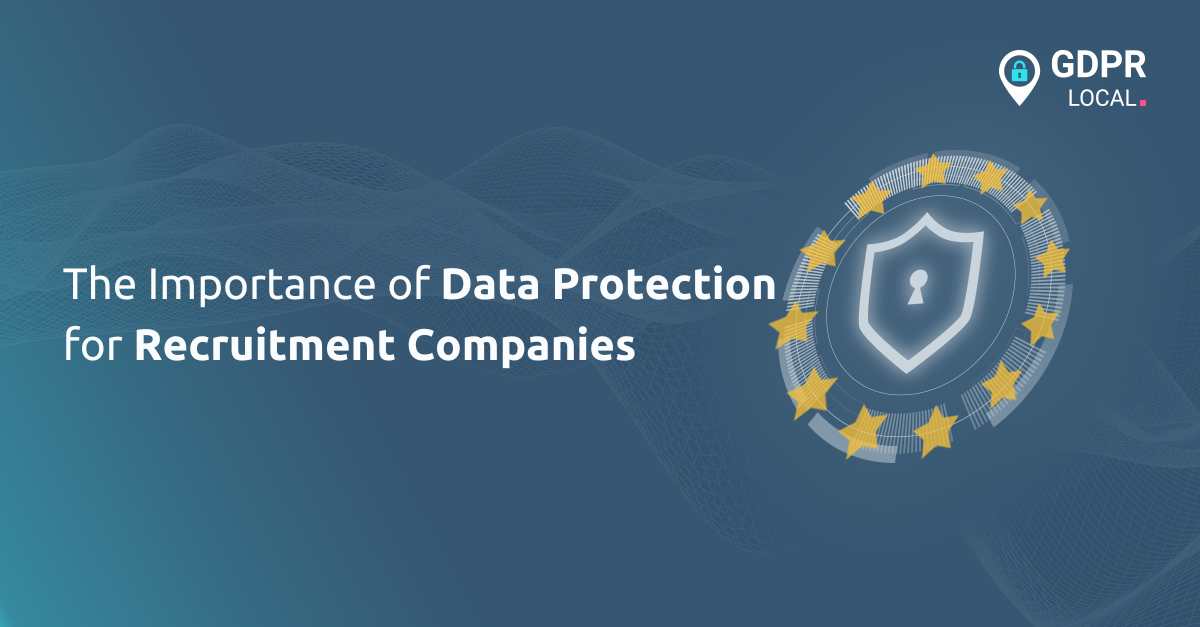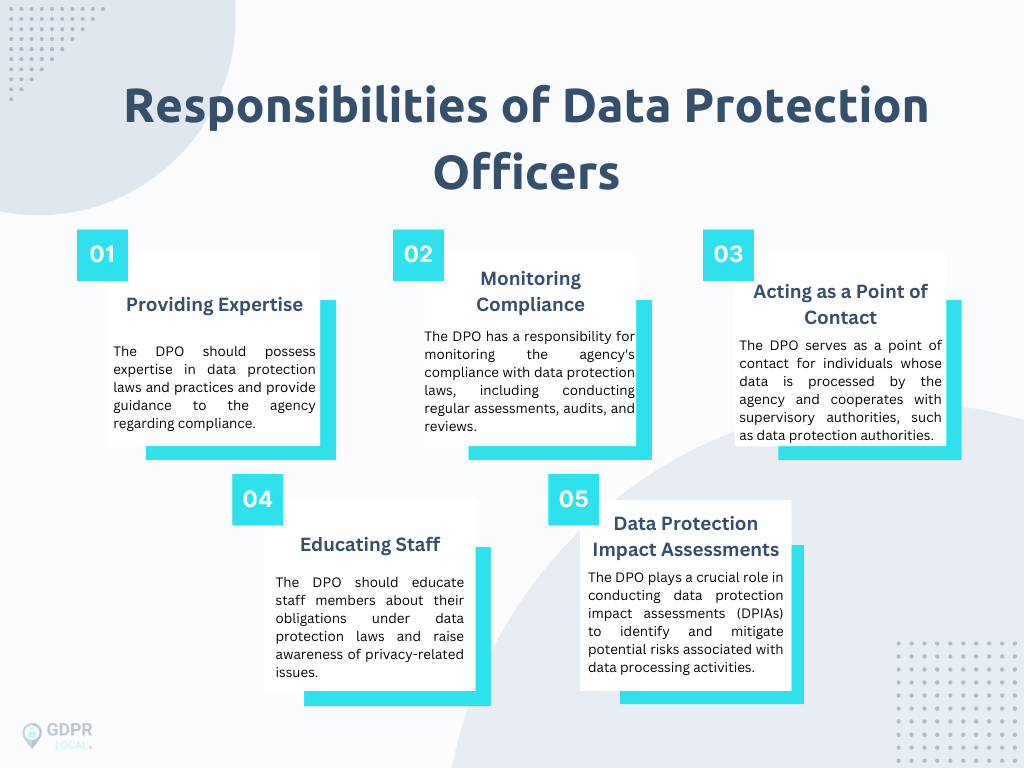
The Importance of Data Protection for Recruitment Companies
Updated, June 2025
Recruitment companies, in particular, handle a vast amount of personal data throughout their operations. From collecting CVs and conducting background checks to storing sensitive information, recruitment agencies must be aware of data protection laws to ensure compliance and protect the privacy of individuals.
Key Takeaways
• A Data Protection Officer (DPO) may be mandatory if your agency’s core activities involve large-scale data processing or handling special categories of data (e.g., health, ethnic origin).
• Determining the need for a DPO requires a thorough assessment of the data you hold, including information within CVs and from social media, not just your company’s size.
• Even if a formal DPO is not required, your agency must still designate someone to manage data protection responsibilities and implement comprehensive compliance policies.
The Role of a Data Protection Officer (DPO) in Recruitment Companies
A Data Protection Officer (DPO) is an individual responsible for overseeing data protection strategies and ensuring compliance with relevant regulations. While the appointment of a Data Protection Officer (DPO) is not mandatory for all businesses, recruitment agencies need to consider the need for a DPO due to the nature of their operations.
Under the General Data Protection Regulation (GDPR), recruitment agencies may be required to appoint a Data Protection Officer (DPO) if their core activities involve the large-scale processing of personal data or the processing of special categories of data, such as ethnic origin or criminal convictions. However, it is crucial to assess the specific data held by the agency and the scale of processing to determine whether a DPO is necessary.
Assessing the Data Held by Recruitment Companies
To determine whether a recruitment company requires a Data Protection Officer (DPO), it is essential to assess the types of data held and the processing activities carried out. Here are some key considerations:
Special Categories of Data
Recruitment agencies should assess whether they hold special categories of data as defined by Article 9 of the GDPR, such as information regarding racial origin, union membership, or health. While most agencies are cautious about storing such data in their CRM systems, it is essential to review the content of CVs and covering letters to ensure compliance.
Personal Data Regarding Criminal Convictions
Recruitment agencies must also consider whether they process personal data relating to criminal convictions, as outlined in Article 10 of the GDPR. This includes assessing whether such data is collected and stored as part of the recruitment process.
Automated Processing and Relational Information Gathering
Suppose the agency’s data processing involves automated search criteria or collects data from social media platforms. In that case, it is crucial to assess the implications for data protection and determine whether a Data Protection Officer (DPO) is necessary.
Understanding “Processing on a Large Scale”
The concept of “processing on a large scale” is relevant when determining the necessity of a Data Protection Officer (DPO). Although the GDPR does not explicitly define the threshold for what constitutes large-scale processing, it is generally associated with significant volumes of data. In the case of a recruitment agency with a database of 150,000 CVs, it is crucial to consider the context and scale of the organisation.
While the GDPR initially targeted businesses with more than 250 employees, smaller agencies should still assess their data processing activities and the potential impact on individuals’ privacy. It is essential to balance the size of the agency, the volume of data processed, and the possible risks to determine the need for a DPO.
The Value of Data and Compliance Measures
In evaluating the necessity of a DPO, recruitment agencies should also consider the value of the data they hold. While the number of CVs may be substantial, it is essential to assess the active records and the potential risks associated with non-compliance. A lean and efficient approach to data management can help agencies focus on the critical aspects of compliance and minimise any possible breaches.
It is essential to note that compliance with the GDPR entails more than just appointing a Data Protection Officer (DPO). Recruitment agencies should adopt a comprehensive data protection policy that addresses key requirements, such as obtaining valid consent, ensuring data accuracy, and implementing appropriate security measures.
The Role of a Data Protection Officer
While the GDPR does not mandate the appointment of a DPO for all recruitment agencies, it is crucial to have a designated individual responsible for data protection. Even if a DPO is not required, the tasks and responsibilities outlined in Article 39 of the GDPR are essential for ensuring proper data governance. These responsibilities include:

Seeking Guidance from the ICO
If recruitment agencies are unsure whether they require a DPO or have questions about their compliance obligations, it is advisable to seek guidance from the Information Commissioner’s Office (ICO). The ICO can provide valuable insights and clarification on specific situations, helping agencies make informed decisions regarding data protection measures.
The ICO values organisations that demonstrate a thoughtful and reasoned approach to data protection. Therefore, even if a DPO is not deemed necessary, documenting the rationale behind the decision and implementing comprehensive data protection measures will enhance the agency’s compliance efforts.
Conclusion: Prioritising Data Protection in Recruitment Companies
Data protection is of paramount importance for recruitment companies, considering the sensitive nature of the personal data they handle. While the appointment of a Data Protection Officer may not be mandatory for all agencies, a systematic and thorough approach to data protection is essential.
Recruitment agencies should assess the types of data they hold, the scale of processing, and the associated potential risks. By implementing robust data protection policies, ensuring compliance with the GDPR, and fostering a culture of privacy, recruitment agencies can safeguard individuals’ personal data and maintain trust with both candidates and clients.
Remember, compliance with data protection laws is an ongoing process, and agencies must stay informed about regulatory updates and adapt their practices accordingly. By prioritising data protection, recruitment agencies can not only meet legal requirements but also establish themselves as trusted partners in the recruitment industry.
How Can We Help?
With a team of experienced professionals well-versed in data protection laws, we understand the unique challenges faced by recruitment agencies and provide tailored solutions to ensure compliance with these laws. We have worked with over 100 recruitment companies, helping them operate in accordance with GDPR and ensure their business is compliant.
Data Protection Consultation: In-depth consultations are essential for recruitment agencies to assess their specific data protection needs. Through a thorough analysis of data processing activities, we can provide guidance on compliance measures and the necessity of appointing a Data Protection Officer.
Policy Development: We assist recruitment agencies in developing robust data protection policies tailored to their specific operations. These policies outline the agency’s commitment to privacy, address key GDPR requirements, and serve as a foundation for compliance.
Training and Education: Our training programs are essential for educating recruitment agency staff about their responsibilities under the GDPR. These training sessions empower employees to handle personal data securely and understand the importance of data protection.
Data Protection Impact Assessments (DPIAs): We conduct DPIAs to identify and mitigate potential risks associated with data processing activities. By conducting thorough assessments, we can help your business proactively address privacy concerns and implement necessary safeguards.
Ongoing Compliance Support: We provide continuing support to recruitment agencies, ensuring they remain up-to-date with evolving data protection laws and regulations. This support includes regular audits, reviews, and updates to policies and procedures to maintain compliance.
Let us help you build a strong foundation for compliance, instil trust among candidates and clients, and mitigate the risks associated with data processing.
Contact us today for a free consultation and discover how our solutions can support your recruitment agency in achieving GDPR compliance and effectively protecting personal data.
FAQ
When is a DPO mandatory for a recruitment agency? Under GDPR, a DPO is mandatory if your core activities involve large-scale, regular monitoring of individuals or large-scale processing of sensitive data, such as health information or criminal convictions.
What is considered ‘large-scale’ processing? While not strictly defined by a number, it relates to processing significant volumes of personal data. An agency with a database of 150,000 CVs, for example, would likely be considered large-scale, regardless of its employee count.
What should we do if we don’t need a mandatory DPO? Even if not mandatory, you must still ensure data protection compliance. It is best practice to assign data protection tasks to a specific individual, document your decision-making process, and maintain robust data security and privacy policies.